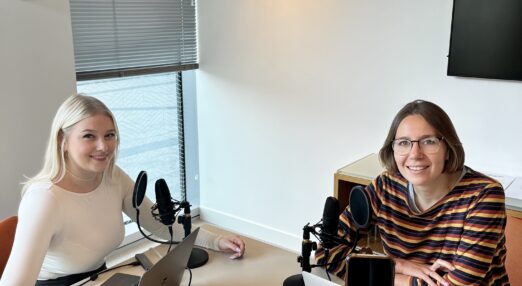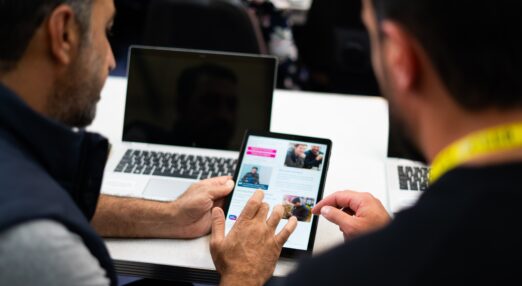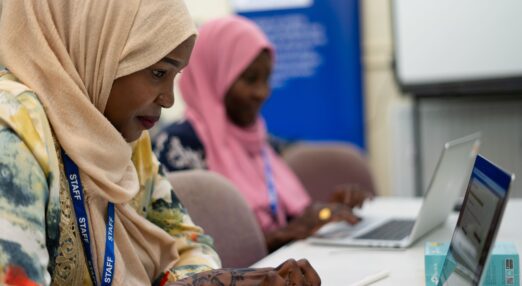Think everyone is online? Think again.
Alison Lawley, Digital Communications & Campaigns Manager, kicks off our annual digital inclusion campaign Get Online Week with a cold hard truth: millions of people still can’t access the internet.
October 16th marks the start of our annual digital inclusion campaign Get Online Week. Digital inclusion, and digital exclusion, are two things we’ve been working towards and working to tackle simultaneously for years. For those of you wondering what digital inclusion/exclusion means, let’s start with some simple definitions.
Digital exclusion is when someone can’t access or doesn’t know how to use digital devices or the internet. They may not be able to afford it or don’t have their own device to use it.
Digital inclusion, on the other hand, is what happens when someone has access to and the skills to use the internet. You right now reading this blog on your phone or laptop are digitally included, and you may think everyone has access to the internet these days. But don’t be fooled – there are millions of people across the UK who are digitally excluded.
A recent radio show host cited the term digital exclusion is ‘jargon.’ And in our recent polling, 46% of people had never heard of it before*. But digital exclusion is not a made up phrase; it’s a very real experience that’s getting worse as tech continues to rapidly evolve.
Enter Get Online Week
Every year we run Get Online Week for three reasons.
- To help more digitally excluded people get online through free, local events that teach them new digital skills.
- To raise the profile of hundreds of community organisations in the National Digital Inclusion Network that offer digital inclusion services.
- To increase awareness of people who are digitally excluded in a society that is now predominantly living online.
While this isn’t the upbeat tone you may have expected at the start of our campaign, it’s a reminder of what we’re working to tackle. A reminder that not everyone is online, despite how easy you may think it is to access the internet or a device. A reminder that these digitally excluded people – those who are often the most vulnerable in our society – are being left on the wrong side of the digital divide.
But positively, and what we’re celebrating this Get Online Week, is the incredibly strong movement that’s working together to fix that divide. 865 events are being held to help thousands of digitally excluded people get online from the northern islands of Scotland to the tip of Cornwall; from Northern Ireland to Kent.
That’s 865 opportunities for digitally excluded people to access the help they need to get online – and just in one week alone! Think of the impact it could have if more people could access local digital inclusion support. So that’s what we’re working to do – engage 5,000 local hubs to support 1 million people by the end of 2025, supporting them with the pillars of digital inclusion.
The pillars of digital inclusion
Consider what you need to get online: beginner digital skills to use technology and the internet, a device to access apps and the internet, and a method of connectivity such as mobile data. Someone who is digitally excluded may lack one or all of these means to get online. At Good Things, we help people gain access to these through Learn My Way, the National Device Bank and the National Databank.
Beginner digital skills through Learn My Way
10.2 million people currently lack the foundation digital skills to get online. Learn My Way is a free online platform that helps people gain those skills through bite-sized topics including using a touchscreen, setting up an email account, using Government or healthcare services and staying safe online.
People can get help to use Learn My Way through a local digital inclusion hub (there are over 1,900 delivering Learn My Way across the UK!), or ask a friend or family member to sign up independently!
Access to a device through the National Device Bank
The National Device Bank accepts donations of unused devices from organisations. Laptops, mobile phones and tablets are securely wiped and refurbished before being sent to digital inclusion hubs across the UK, landing in the hands of those that need them.
Since launching the National Device Bank one year ago, we’ve distributed over 6,000 refurbished devices donated by companies including Microsoft, Deloitte, Ocado and Which?. But 68% of our hubs have told us they need more devices to keep up with demand – could your organisation donate?
Mobile connectivity through the National Databank
Not being able to use the internet doesn’t only affect those with low digital skills. 1 in 14 UK households currently have no home internet access; something that’s only been made worse because of the cost-of-living crisis. The National Databank helps people get connected by providing free mobile data – like a foodbank, but for connectivity.
There are currently over 1,300 digital inclusion hubs providing the National Databank across the UK.
Help others get online
Our recent polling shows that this relatively hidden issue is actually far reaching than you may think. If more than 33% of people are supporting someone they love to get online already, then there’s a chance you know someone who would benefit from digital inclusion support; whether that’s learning beginner digital skills or accessing devices and data.
Could you help someone to get online during Get Online Week? Take part in the UK’s largest digital inclusion campaign and check out our map of events to find an event happening near you or a loved one.
Or, read more about our services to see how you can help us fix the digital divide – for good.
* PublicFirst poll for Good Things Foundation, May 2023. Surveyed 1,011 adults in the UK – figures are weighted and are nationally representative.
More good things
-

Unlocking Good Things: new podcast series
During Get Online Week we're launching a daily mini-podcast series. Tune in from October 16-20th to hear how our digital inclusion services unlock good things for digitally excluded...
-

Learn My Way: Building digital confidence one topic at a time
Since the launch of the new Learn My Way, many learners have already built their digital skills to apply their knowledge to the real world.
-

Five ways digital exclusion affects people
Natasha Bright-Wray, Associate Director of Communications, Campaigns and Advocacy, reveals five alarming realities faced by those who are digitally excluded in the UK.
